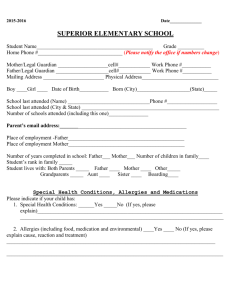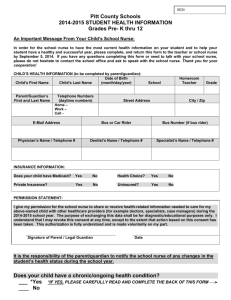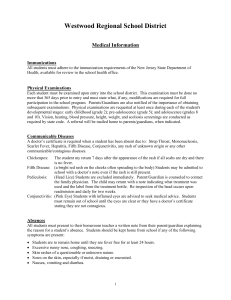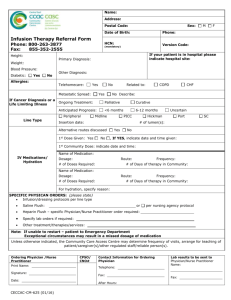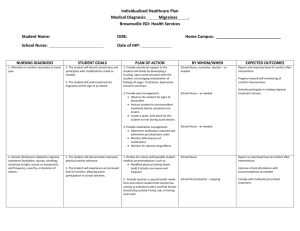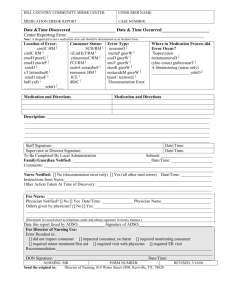453.8 RULE (1) SPECIALIZED STUDENT HEALTH CARE
advertisement
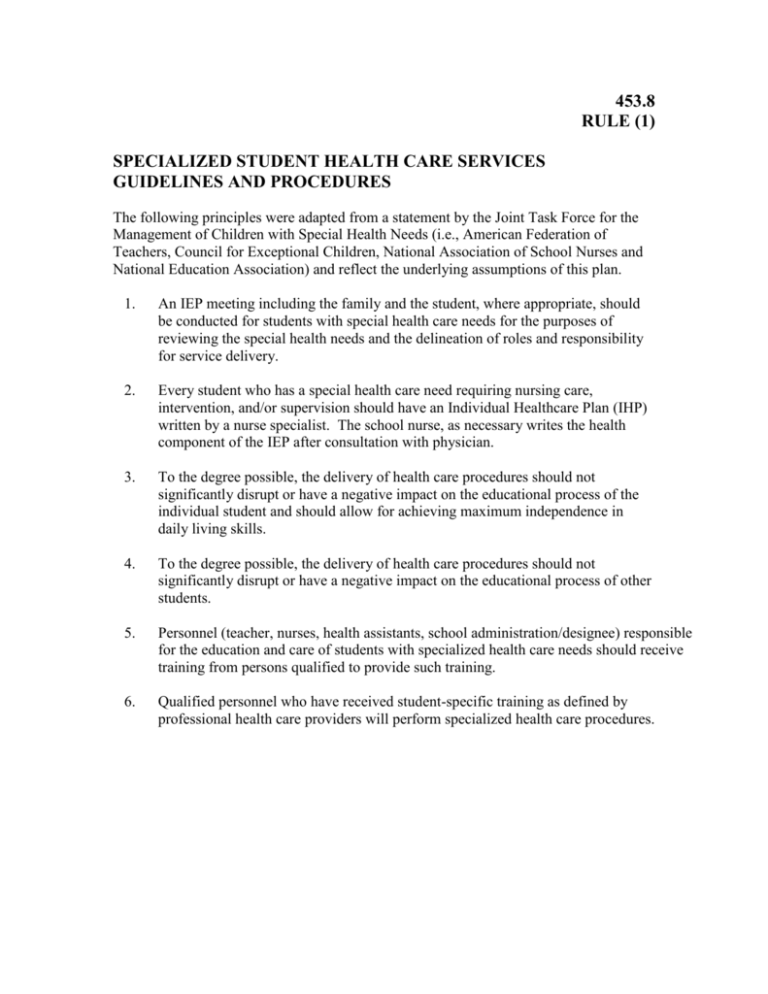
453.8 RULE (1) SPECIALIZED STUDENT HEALTH CARE SERVICES GUIDELINES AND PROCEDURES The following principles were adapted from a statement by the Joint Task Force for the Management of Children with Special Health Needs (i.e., American Federation of Teachers, Council for Exceptional Children, National Association of School Nurses and National Education Association) and reflect the underlying assumptions of this plan. 1. An IEP meeting including the family and the student, where appropriate, should be conducted for students with special health care needs for the purposes of reviewing the special health needs and the delineation of roles and responsibility for service delivery. 2. Every student who has a special health care need requiring nursing care, intervention, and/or supervision should have an Individual Healthcare Plan (IHP) written by a nurse specialist. The school nurse, as necessary writes the health component of the IEP after consultation with physician. 3. To the degree possible, the delivery of health care procedures should not significantly disrupt or have a negative impact on the educational process of the individual student and should allow for achieving maximum independence in daily living skills. 4. To the degree possible, the delivery of health care procedures should not significantly disrupt or have a negative impact on the educational process of other students. 5. Personnel (teacher, nurses, health assistants, school administration/designee) responsible for the education and care of students with specialized health care needs should receive training from persons qualified to provide such training. 6. Qualified personnel who have received student-specific training as defined by professional health care providers will perform specialized health care procedures. 453.8 RULE (2) Guidelines and Procedures 1. Students with special health care needs are those who require individualized health related interventions other than simple administration of medication to enable participation in the educational process. Included within this population are also those students: a. Who may require more complex administration of medication and/or treatments during the school day; b. Who may be characterized by the use of a particular health care device that compensates for the loss of a body function; c. Whose health condition may require routine or emergency health care procedures; and d. Who may require the provision of substantial, complex, or frequent health care procedures. 2. Special health care services include services prescribed by a licensed physician which require medically related training to carry out, are provided to selected public school students during the school day, and are necessarily provided at school to enable the child to attend school. 3. Special health care services include medical treatments and procedures that support the student with a chronic health condition while maintaining a safe school environment for students and staff. 4. Special health care services are to be given according to standardized procedures. Standardized procedures include protocols developed by a school nurse in collaboration with parents, school administrators, and attending physicians. Special health care services are performed after the following conditions have been met: a. A written request from a parent or guardian, written orders from an attending physician and an IHP developed by a school nurse. b. An IEP, in the school where the student is enrolled, will plan, implement and evaluate the delivery of care. 5. The district or building level committee IEP that reviews health care needs may include: 453.8 RULE (3) a. Health care professionals (school nurse, student's physician, and other health care providers), b. Parent/guardian c. Teacher(s) d. Student e. School administration/designee f. School counselor 6. In considering the request for special health care services, the following factors shall be considered: a. Clarify the needs of the student as well as parental and staff concerns. b. Develop strategies to modify the regular program to accommodate the student's special health needs, if at all possible. c. Determine the necessity of specialized health care services being provided during school hours. d. Determine the special conditions, if any that may suggest that a specific school facility be the most appropriate for that student in question. e. Delineate who and how many primary or secondary people will provide the special health care services (i.e., Policy 453.7 - Relations with Non-School Agency Nursing Personnel). f. Determine how the provider will be trained and who will supervise the provision of the service. g. In collaboration with the school nurse, the district will procure health care providers in the absence of regular assigned staff. h. Determine the likelihood that the parent/guardian can and will assume continuing responsibility for purchasing, providing, and transporting the equipment, supplies/materials, and medications needed. (See Policy 453.4 Medication and Treatment.) 453.8 RULE (4) i. Monitor the student's adjustment to the modified regular school program with collaboration with team members. 7. When an IEP meeting is called, it brings together designated school personnel including the school nurse, parent(s) and others as indicated to determine the possible need for special health care services. The team (with the school nurse having major responsibility) is to: a. Determine who is responsible for documenting the competence of the provider of the specialized physical health care service. This process includes training, regularly scheduled monitoring, and return demonstrations. b. Identify the level of supervision needed. c. Determine who will administer or monitor any medication or treatments needed by the student. (See 453.41-R & 453.42-R - Medication and Treatment.) 8. The school nurse may delegate special health care procedures to designated personnel who will have orientation, instruction and direction by the school nurse. The school nurse will document satisfactory completion of training and ongoing supervision. Parents will be kept fully informed of special health care treatments and procedures. (See Nurse Practice Act. WI Statue: 441.01 and Chapter N6; Federal Reg. 94-142) 9. Within the context of an Individual Healthcare Plan (IHP), there are two levels of supervision by a school nurse: a. Direct supervision means immediate availability to continually coordinate, direct an inspect at first hand the practice of another. The supervisor is physically present while a procedure is being administered, or, the supervisor is present in the same building as the person being supervised and is available for consultation; and b. General supervision means regular availability to coordinate, direct and inspect the practice of another. General/supervision includes an on-site personal review. Also included is a review of the individual's competence in performing the specialized health care service and in maintaining the appropriate records and physical environment and any necessary equipment. (See Nurse Practice Act. WI Statue: 441.01 and Chapter N6.) 453.8 RULE (5) 10. The Individual Healthcare Plan (IHP) is developed by the school nurse and should include the following: a. The current medical information and the prescribed care ordered by the physician. b. The specific procedure(s) to be delivered. c. The complexity, anticipated frequency and severity of the episodes requiring special health care services and the level of supervision required. d. The designated trained personnel to carry out procedures. e. Appropriate safeguards, including the availability of Emergency Medical Services (EMS), recordkeeping, storage and maintenance of equipment measures for the safe transportation of student, and the feasibility of administering health care services during transportation. f. Designation of an appropriate area in the school for the administration of special health cares services and the storage of necessary equipment and supplies. The area should provide appropriate accommodations for safety and personal privacy. g. An adequate emergency plan including authorization for emergency services. The parent/guardian shall be responsible for providing current emergency information for school use. h. Transition services appropriate to the student's health condition. 11. When the written plan (Individualized Educational Plan and IHP) is fully developed and the orientation and training has been completed, all members of the team shall acknowledge their role in implementing the plan in writing. 12. A plan for maintaining and servicing the equipment necessary to follow the IHP shall be developed and implemented in cooperation with the parent/guardian. 13. All records and information shall be maintained in accordance with board policy related to student records. (See 346 - Student Records.) 453.8 RULE (6) 14. When the duration of a special health care services plan has ended or at the end of a school year, parent/guardian shall be responsible for picking up any unused medications and equipment. (See 453.41-R & 453.42-R - Medication and Treatment.) 15. Each school year, existing special health care services requests must be renewed with a new written request from both physician(s) and parent/ guardian. Admission to school may initially be delayed up to ten (10) school days until proper assessment and the school nurse can achieve evaluation. This may involve equipment procurement; training of assistive personnel or until appropriate placement is made. The IHP shall be revised as needed during the school year. 16. Providing required special health care services by school personnel creates special medical, legal and administrative responsibilities that must be considered in determining student placement. Students requiring special health care services should not attend school until a safe and appropriate educational environment can be provided. LEGAL REFERENCE: WISCONSIN STATUTES 441.01 Board of Nursing WISCONSIN ADMINISTRATIVE CODE: Chap. N6 (Nurse Practice Act) PI-11 FEDERAL REGULATIONS: PL 94-142, Education of the Handicapped Act (EHA) PL 99-457 PL 101-476, Individuals with Disabilities Education Act (IDEA) CROSS-REFERENCE: 346 453.4 453.41 Rule 453.42 Rule 453 Student Records Medication and Treatment Medication and Treatment (Medication) Medication and Treatment (Treatment) Relations with Non-School Agency Nursing Personnel The Joint Task Force for the Management of Children with Special Health Needs. (1990). Guidelines for the Delineation of Roles and Responsibilities for the Safe Delivery of Specialized Health Care in the Educational Setting. Reston, VA. The Council for Exceptional Children. Approved: April 13, 2000 FRIESS LAKE SCHOOL DISTRICT Hubertus, Wisconsin
